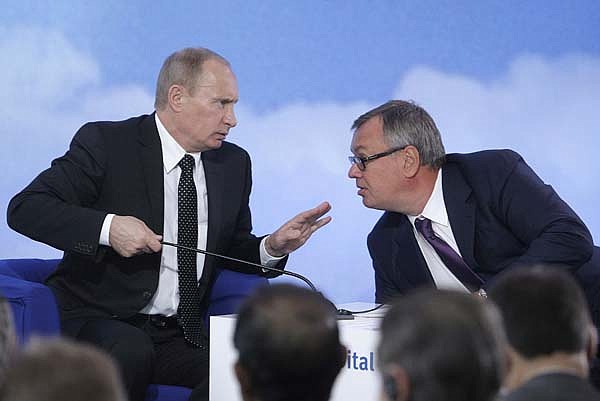MOSCOW — Prime Minister Vladimir Putin told investors Tuesday that the government will reduce its role in the Russian economy and ownership of companies over the coming years to allow for better growth.
Speaking at a forum aimed at promoting Russia's business climate, Putin and other government officials tried to convince investors that the worst of the crisis that has pounded Russia's economy was over.
Still, Russia's weakened economic state was highlighted Tuesday by the Central Bank, which cut its key interest rate by half a percentage point to 10 percent- the seventh such cut since the spring.
The bank said the cut would take effect today and was "based on the need for additional stimulation of economic activity."
Like other countries, Russia has battled the crisis by propping up key troubled industries, such as the banking or auto sectors, with millions of dollars in loans and by buying up shares in companies. That has worried investors who fear that in the long term Russia, with its economy already dominated by state- and public-sector industries, will stagnate.
Putin defended the government's sizable intervention in the economy, telling participants at the Russia Calling forum - sponsored by state-owned bank VTB - that the state's response had been measured.
"There was no massive nationalization, no moving toward all-encompassing administrative regulation. We upheld the free movement of capital and the convertibility of the ruble," Putin said.
He also vowed that the government would gradually sell off its shares in companies - notably VTB - and scale back its role in the economy.
"There will be no return to the past. Russia will remain a liberal market economy," he said.
"We plan to consistently and purposefully reduce state intervention in the economy and, moreover, step up privatization processes," he said.
Finance Minister Alexei Kudrin told the forum earlier that up to half of Russia's economy is dominated by the state sector and suggested that was impeding growth.
The torrid growth that Russia saw in the past decade was fueled largely by exports of raw materials such as oil, gas and timber and minerals such as nickel. The collapse in raw material prices helped drag the economy down sharply and it is expected to shrink by up to 8.5 percent this year.
Kudrin said Russia should expect a "long exit from the crisis," although earlier he sounded upbeat in comments to the Russian parliament's upper chamber.
"One could say today that Russia has exited the recession," he was quoted as saying by news agencies. "It is also possible to say that we are today going through a certain juncture after which investment activity will start to increase."
Economic troubles have not led to significant unrest among Russians and have done little visible damage to support ratings for Vladimir Putin, the popular recovery era president who is now prime minister, and President Dmitry Medvedev.
Business, Pages 25, 26 on 09/30/2009

